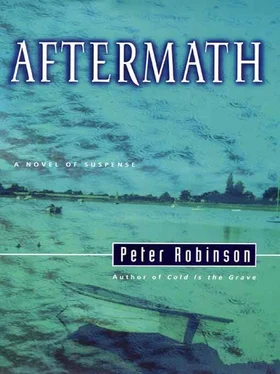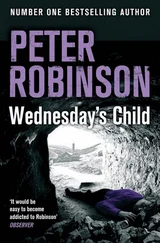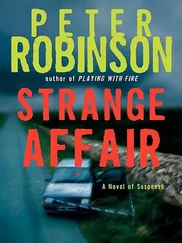Banks hated hospitals, hated everything about them, and he had done so ever since he’d had his tonsils out at the age of nine. He hated the smell of them, the colors of the walls, the echoing sounds, the doctors’ white coats and the uniforms the nurses wore, hated the beds, thermometers, syringes, stethoscopes, IVs, and the strange machines glimpsed behind half-open doors. Everything .
If truth be told, he had hated it all since well before the tonsil experience. When his brother, Roy, was born, Banks was five, seven years too young to be allowed inside a hospital at visiting time. His mother had some problems with the pregnancy – those unspecified adult problems that grown-ups always seemed to be whispering about – and spent an entire month there. Those were the days when they’d let you hang on to a bed that long. Banks was sent away to live with his aunt and uncle in Northampton and went to a new school for the whole period. He never settled in, and being the new boy, he had to stick up for himself against more than one bully.
He remembered his uncle driving him to the hospital to see his mother one dark, cold winter’s night, holding him up to the window – thank God she was on the ground floor – so he could wipe the frost off with his wool mitten and see her swollen shape halfway along the ward and wave to her. He felt so sad. It must be a horrible place, he remembered thinking, that would keep a mother from her son and make her sleep in a room full of strange people when she was so poorly.
The tonsillectomy had only confirmed what he already knew in the first place, and now he was older, hospitals still scared the shit out of him. He saw them as last resorts, places where one ends up , where one goes to die, and where the well-intentioned ministrations, the probing, pricking, slicing and all the various ectomies of medical science only postpone the inevitable, filling one’s last days on earth with torture, pain and fear. Banks was a veritable Philip Larkin when it came to hospitals, could think only of “the anesthetic from which none come round.”
Lucy Payne was under guard at Leeds General Infirmary, not far from where her husband lay in intensive care after emergency surgery to remove skull splinters from his brain. The PC sitting outside her room, a dog-eared Tom Clancy paperback on the chair beside him, reported no comings or goings other than hospital staff. It had been a quiet night, he said. Lucky for some, Banks thought as he entered the private room.
The doctor was inside waiting. She introduced herself as Dr. Landsberg. No first name. Banks didn’t want her there, but there was nothing he could do about it. Lucy Payne wasn’t under arrest, but she was under the doctor’s care.
“I’m afraid I can’t give you very long with my patient,” she said. “She has suffered an extremely traumatic experience, and she needs rest more than anything.”
Banks looked at the woman in the bed. Half her face, including one eye, was covered with bandages. The eye that he could see was the same shiny black as the ink he liked to use in his fountain pen. Her skin was pale and smooth, her raven’s-wing hair spread out over the pillow and sheets. He thought of Kimberley Myers’s body spread-eagled on the mattress. That had happened in Lucy Payne’s house , he reminded himself.
Banks sat down beside Lucy, and Dr. Landsberg hovered like a lawyer waiting to interrupt when Banks overstepped his PACE bounds.
“Lucy,” he said, “my name’s Banks, Acting Detective Superintendent Banks. I’m in charge of the investigation into the five missing girls. How are you feeling?”
“Not bad,” Lucy answered. “Considering.”
“Is there much pain?”
“Some. My head hurts. How’s Terry? What’s happened to Terry? Nobody will tell me.” Her voice sounded thick, as if her tongue were swollen and her words were slurred. The medication.
“Perhaps if you just told me what happened last night, Lucy. Can you remember?”
“Is Terry dead? Someone told me he was hurt.”
The concern of the abused wife for her abuser – if that was what he was witnessing – didn’t surprise Banks very much at all; it was an old sad tune, and he had heard it many times before, in all its variations.
“Your husband was very badly injured, Lucy,” Dr. Landsberg cut in. “We’re doing all we can for him.”
Banks cursed her under his breath. He didn’t want Lucy Payne to know what kind of shape her husband was in; if she thought he wasn’t going to survive, she could tell Banks whatever she wanted, knowing he’d have no way of checking whether it was true or not. “Can you tell me what happened last night?” he repeated.
Lucy half closed her good eye; she was trying to remember, or pretending she was trying to remember. “I don’t know. I can’t remember.”
Good answer, Banks realized. Wait and see what happens to Terry before admitting to anything. She was sharp, this one, even in her hospital bed, under medication.
“Do I need a lawyer?” she asked.
“Why would you need a lawyer?”
“I don’t know. When the police talk to people… you know, on television…”
“We’re not on television, Lucy.”
She wrinkled her nose. “I know that, silly. I didn’t mean… never mind.”
“What’s the last thing you remember about what happened to you?”
“I remember waking up, getting out of bed, putting on my dressing gown. It was late. Or early.”
“Why did you get out of bed?”
“I don’t know. I must have heard something.”
“What?”
“A noise. I can’t remember.”
“What did you do next?”
“I don’t know. I just remember getting up and then it hurt and everything went dark.”
“Do you remember having an argument with Terry?”
“No.”
“Did you go in the cellar?”
“I don’t think so. I don’t remember. I might have done.”
Covering all the possibilities. “Did you ever go in the cellar?”
“That was Terry’s room. He would have punished me if I went down there. He kept it locked.”
Interesting, Banks thought. She could remember enough to distance herself from whatever they might have found in the cellar. Did she know? Forensics ought to be able to confirm whether she was telling the truth or not about going down there. It was the basic rule: wherever you go, you leave something behind and take something with you.
“What did he do down there?” Banks asked.
“I don’t know. It was his own private den.”
“So you never went down there?”
“No. I didn’t dare.”
“What do you think he did down there?”
“I don’t know. Watched videos, read books.”
“Alone?”
“A man needs his privacy sometimes. That’s what Terry said.”
“And you respected that?”
“Yes.”
“What about that poster on the door, Lucy? Did you ever see it?”
“Only from the top of the steps, coming in from the garage.”
“It’s quite graphic, isn’t it? What did you think of it?”
Lucy managed a thin smile. “Men… men are like that, aren’t they? They like that sort of thing.”
“So it didn’t bother you?”
She did something with her lips that indicated it didn’t.
“Superintendent,” Dr. Landsberg cut in, “I really think you ought to be going now and let my patient get some rest.”
“Just a couple more questions, that’s all. Lucy, do you remember who hurt you?”
“I… I… it must have been Terry. There was no one else there, was there?”
“Had Terry ever hit you before?”
She turned her head sideways, so the only side Banks could see was bandaged.
“You’re upsetting her, Superintendent. I really must insist-”
Читать дальше












